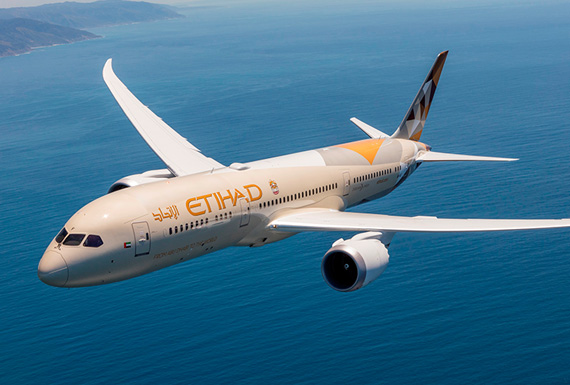Etihad Airways show progressive recovery across its business despite slower return to global air travel
Etihad Airways has announced operating and financial results for the first half of 2021, showing a progressive recovery across its business despite a slower than expected return to global air travel.
The airline carried one million passengers in H1 2021, with an average seat load factor of 24.9%. This represents an average 10% month-on-month growth in passenger volumes since Etihad restarted passenger operations in July 2020.
Network capacity in the first half of 2021 came in at 16.4 billion ASKs, and has grown steadily since the start of the year, with the airline operating almost 3,500 flights a month to 67 passenger and cargo destinations by the end of June 2021. Since the beginning of 2021, Etihad has launched or restarted operations to 10 destinations including the historic launch of scheduled services to Tel Aviv in April 2021.
As a result of new variants of the coronavirus affecting key travel markets in the Indian Sub-Continent and Europe, passenger revenue came in at US$0.3 billion, down by 68% year-on-year from US$1.0 billion. However, the dip in passenger revenue was offset by strong performance in cargo operations, with a 44% year-on-year increase in freight carried in H1 2021 (365,500 tons) and a 56% year-on-year increase in revenue (US$0.8 billion).
Tony Douglas, Group Chief Executive Officer, said: “Every day, Etihad Airways is making up for lost ground. Despite the curveball of the Delta variant disrupting the global recovery in air travel, we have continued to ramp up operations and are today in a much better place than this time in 2020. As soon as destinations are added to the Abu Dhabi green list or UAE travel corridors, we are seeing a three to six-fold jump in bookings in some cases, showing there is a tidal wave of demand waiting to be unleashed. We are ready to welcome more guests on board to experience why Etihad is second to none when it comes to ensuring passenger wellbeing.”
Throughout the first half of 2021, Etihad retained a singular focus on cost control, decreasing operating costs by 27% year-on-year from US$1.9 billion to US$1.4 billion, supported by reduced capacity and volume-related expenses. Fixed overhead costs saw a significant improvement, reducing by 22% to US$0.3 billion, while finance costs reduced by 22% owing to an ongoing balance sheet deleveraging. As a result, the airline managed to rebuild its liquidity position to pre-pandemic levels.
Overall, Etihad recorded a core operating loss of $0.4 billion for H1 2021 (half the loss of $0.8 billion in H1 2020), with EBITDA turning to a positive US$0.1 billion from a negative $0.1 billion in the same period of 2020.
Adam Boukadida, Chief Financial Officer, said, “While market demand has been slower to recover than anticipated, our record cargo performance has continued to buoy the business. At the same time, we have continued to strengthen underlying fundamentals to place Etihad in a better position to maximize the value of passenger revenue as our volumes return. Our rock-solid credit rating has remained unwavering throughout the pandemic and was once again reaffirmed at ‘A with a stable outlook’ by Fitch in April 2021, serving as a clear sign of the long-term financial viability of our business. While the pandemic still poses challenges, Etihad is on the path to becoming a sustainable and profitable business.”
Etihad Airways has recorded strong results in cargo operations in H1 2021 as it continued to play a critical role in facilitating international trade.
As a founding member of the HOPE Consortium, an Abu Dhabi coalition formed in November 2020 to distribute COVID-19 vaccines across the world, the airline has carried tons of crucial vaccine shipments in support of global vaccination efforts throughout the first half of 2021.
To date, the Hope Consortium has handled more than 65 million vaccines across 40 countries in the Middle East, Africa, Europe, Asia, and South America.
The airline’s best-in-class PharmaLife product, which offers a temperature-controlled air cargo solution for pharmaceuticals, has seen a 94% year-on-year increase in shipments compared to H1 2020.
To provide much-needed cargo capacity, Etihad Airways has temporarily modified five Boeing B777 aircraft to support cabin loading, operating more than 430 charter and scheduled cargo flights with the new configuration.


